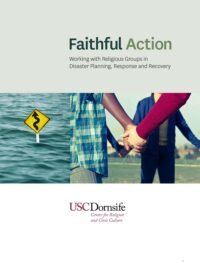Faith-based organizations represent an important ally for public agencies as they seek to strengthen and enhance disaster preparedness and response in California. Because of their diversity and ubiquity, faith-based organizations serve as bedrock institutions of many neighborhoods, especially in low-income and predominantly immigrant communities. Moreover, they are often trusted sources of information, counseling, and social services of all kinds. Many faith-based organizations have the capacity to respond to disasters and have physical resources that can be utilized to serve in times of need. Other faith-based organizations must be encouraged to expand their vision to include the world beyond their limited definition of community.
For public agencies, faith-based organizations represent a challenge. Not only are they numerous, but they often have cultural, linguistic, and religious barriers that must be overcome. Intermediary organizations could play a significant role in overcoming barriers by assisting both agencies and FBOs and providing the appropriate toolkits to enhance understanding. The authors of this report contend that strengthening networks through intermediaries, building knowledge in public agencies and FBOs, and facilitating the ability of FBOs to serve during and after disasters will benefit the people of California and enhance the ability of communities to prepare for and recover from disasters.
Brie Loskota is the former executive director (2016-2021) of the USC Center for Religion and Civil Culture.
Hebah Farrag was the assistant director of research of the USC Center for Religion and Civic Culture through 2023.
Richard Flory is the executive director of the USC Center for Religion and Civic Culture.
